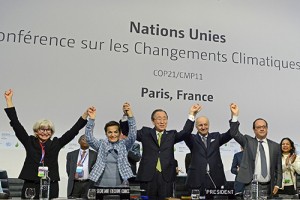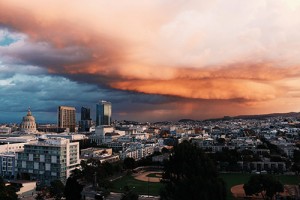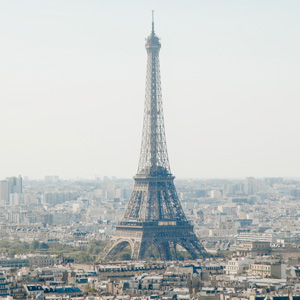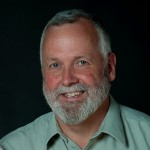‘We have an agreement.’ With those words, Laurent Fabius, Foreign Minister of France and head of the United Nations’ 21st Conference of the Parties, commonly known as COP 21, announced one of the most important international agreements ever. It was December 18, 2015, in Le Bourget, France, outside of Paris. Some 197 nations had just agreed unanimously to take concrete steps to reverse centuries of damage to God’s creation and the Earth’s climate system by reducing emissions of carbon dioxide and the other greenhouse gases.
Unprecedented achievements

The unanimous adoption of what has become known as the Paris Agreement[1] was almost miraculous. Such a thing has never happened before. However, there is more: diplomatic negotiations always achieve less in the end than was hoped for at the beginning. Not this time. The COP 21 final agreement was stronger than the original goal. Having planned to call for policies and plans that would limit future temperature increases to 2.0 degrees Celsius above pre-industrial levels, delegates instead opted for a target limiting future temperature rises to ‘well below 2°C above pre-industrial levels and pursuing efforts to limit the temperature increase to 1.5°C above pre-industrial levels’.[2]
Most surprising of all, the final Paris Agreement is based not on economics or business concerns or political realities, but rather on a genuine concern for the poor of the world who are most at risk. In a world marked by partisan rancor and often greedy self-interest, COP 21 produced the opposite—a document that expresses an almost biblical call for righteousness, compassion, and justice.
Evangelical presence
How did this happen? One of the major factors was that faith communities generally and evangelical Christians in particular made their presence known and their voices heard at COP 21. As a senior representative of the United States delegation said, ‘The faith community has been essential in making the case that confronting climate change is our moral responsibility. The Christian community has led that effort, helping to push for a strong agreement that protects vulnerable and threatened communities.’[3]
The global church speaks out—and people listen
The Lausanne Creation Care Network (LCCN) is one of Lausanne’s newest issue networks and is a primary umbrella for evangelicals around the world working in the area of environment or creation care. LCCN played a crucial organizing role to bring a broad evangelical partnership to COP 21. Hosted by A Rocha France, the partnership included A Rocha International, the World Evangelical Alliance, Tearfund, World Vision, Climate Caretakers, Young Evangelicals for Climate Action, two US grassroots organizations, and others.[4]
Bishop Efraim Tendero, Secretary General of the WEA, was the public face of this coalition and worked tirelessly both within the official arena and outside it to communicate the moral and spiritual aspects of climate change. Coming from the Philippines, one of the countries most vulnerable to the impacts of climate change, he was an accredited member of the Filipino delegation. Speaking in Paris, Tendero said:
There is a moral component to the whole discussion of climate change. The decision to reduce our carbon footprint is rooted in the ethical foundation that human life needs to be protected and nurtured. Shifting to renewable sources of energy over against the harmful fossil-based energy is not only a scientific endeavor, but an ethical action that seeks the long-term survival and well-being of humanity.[5]
The historical parallel that comes to mind here is the decades-long struggle to end slavery in the British Empire two hundred years ago, an effort led by a passionate evangelical Christian, William Wilberforce. Perhaps we are witnessing a ‘Wilberforce moment’, when the church discovers that it can have a powerful voice in world affairs. There is no question that the global evangelical community spoke with a strong voice at COP 21, and that the governments of the world listened. Because of this, the climate conversation has permanently shifted from merely economics and politics to include morality and concern for those Jesus called the least of these.
So what is in the Paris Agreement?
The Paris Agreement lays the groundwork for a climate response in two important areas: Mitigation and Adaptation.
Mitigation
This is the process of reducing emissions in order to stop climate change from getting worse, and to try ultimately to reverse the process. The Paris Agreement calls for voluntary but transparent commitments by nations to drastically reduce the greenhouse gas emissions that drive climate change in order to keep future temperature rises below 2 or perhaps even 1.5 degrees Celsius. These commitments, known as INDCs (Intended Nationally Determined Contributions), outline what each nation is willing to do on its own to address this problem. While there was earlier concern that nations would not respond, and while it remains true that the reductions contained in the INDCs taken together do not go nearly far enough (see below), the commitments that have been made exceed what most people expected.
Adaptation
Mitigation is not enough. A great deal of damage has already been done to the climate system and much more will occur before any reduction in emissions begins to take effect. Mitigation therefore has to be accompanied by adaptation—addressing the problems caused by climate change such as weather extremes, sea level rise, shrinking food supplies, political instabilities, and climate refugees.
Adaptation costs money. One of the tragic ironies of climate change is that those nations most likely to be harmed by this problem, and therefore facing the highest costs to adapt to it, have done least to cause it. The Paris Agreement provides for a funding mechanism through the Green Climate Fund by which means developing nations which will bear the greatest burden of adaptation will be able to receive assistance from developed nations to the tune of at least US$100 billion per year beginning in 2020. While it is a long road from creating a mechanism to actually providing funds to those who need it, the Paris Agreement is a start.
A ‘runaway train’
Paris is not the end, but one stop on a long journey. Even as I write these words, reports are coming in from Fiji about a typhoon with 177 mile per hour winds—the strongest storm ever recorded in the southern hemisphere. This closely follows Hurricane Patricia that struck Mexico last October, the strongest storm ever recorded in the northern hemisphere. The effects of climate change are already all around us, and are increasing year by year.
Imagine a train running at top speed through the countryside. Somewhere ahead of it is a curve that must be taken slowly; otherwise the train will leave the tracks. It will take many miles to slow this train down, and it should be decelerating now, rather than continuing to increase speed.
Climate change is like that train. The curve is a point in time by which we must reduce global emissions to a safe level if we are to avoid catastrophe. The Paris Agreement’s goal of ‘less than 2 degrees’ is the maximum speed at which it is hoped that the climate train can negotiate the curve without going off the tracks completely. However, others believe that number is still far too high—that even 1.5 degrees may be too fast for a safe passage. The fear among many is that even if all of the provisions of the Paris Agreement are implemented, we might not be able to slow the climate train enough to safely round that curve.
Paul Cook, Tearfund’s Advocacy Director, sums it up this way:
This is a good step forward, but let’s not be complacent. [The Paris Agreement] doesn’t give us everything we need [and] Christians around the world will be praying that governments will accept their responsibilities, challenging them to do so, and celebrating with them when they do take the bold action required.[6]
What should we do?

To put it simply, a world devastated by climate change will be a world wracked by unimaginable human suffering, such as we can see in Syria, a man-made humanitarian crisis that has spilled beyond the Middle East, even affecting politics and policies in the European Union, the US, and Canada. Crucially for those of us involved in the broader ministries of the church, Syria has become a place where most of the normal functions of the church (worship, evangelism, children’s ministries, etc) have become difficult or even sometimes impossible.
What is not commonly understood is that Syria is a man-made disaster in which climate change is very likely a significant causal factor. According to a study published by the US National Academy of Sciences in March 2015,[7] extreme drought for four years (2006 to 2009) was made more likely and more severe by climate change, and led to mass migrations into cities, and stress on an already weak and corrupt political system. Much of the world will look like Syria in 20 or 30 years without a massive effort to slow down the climate change train.
So how should we respond? The Lausanne/WEA Creation Care Network website[8] has a good list of resources and a schedule of future events in the Lausanne Global Campaign for Creation Care and the Gospel, as well as the Jamaica Call to Action,[9] a document we urge every evangelical to read, sign, and share.
More specifically, we would urge all to do the following:
- Understand that climate change and other threats to God’s creation are real and serious problems, and that it is appropriate and necessary for Christians—individuals, congregations, ministries—to engage.
- Live and work according to the principles of good and godly stewardship and simple lifestyle (a concept that was endorsed in Lausanne Occasional Paper 20 (LOP20)[10] 36 years ago).
- Hold our governments and political leaders accountable for each of our countries’ commitments to the Paris Agreement in whatever ways are possible in our various political contexts.
- Connect with and support the Lausanne/WEA Creation Care Network by writing to us at creationcare@lausanne.org.
Climate change is without question one of the biggest challenges the human race has ever faced. However, let us not forget that we, as God’s people, can face this as we face every other challenge, with confidence in the One to whom ‘all authority in heaven and on earth’ has been given, and who has promised that He will be with us ‘to the very end of the age’.
Endnotes
- https://unfccc.int/resource/docs/2015/cop21/eng/l09r01.pdf
- Ibid.
- From Global Evangelical Leaders Welcome Paris Climate Agreement as Historical Accomplishment, a joint statement issued after the Paris Agreement. View online at http://lwccn.com/joint-statement-evangelical-leaders-praise-the-paris-climate-agreement/.
- Earlier this year, the World Evangelical Alliance’s Creation Care Task Force joined the Lausanne Creation Care Network, creating the Lausanne/WEA Creation Care Network as a single global resource for the evangelical church around the world.
- From Global Evangelical Leaders Welcome Paris Climate Agreement as Historical Accomplishment, a joint statement issued after the Paris Agreement. View online at http://lwccn.com/joint-statement-evangelical-leaders-praise-the-paris-climate-agreement/.
- Ibid.
- http://www.nytimes.com/2015/03/03/science/earth/study-links-syria-conflict-to-drought-caused-by-climate-change.html?_r=0
- http://lwccn.com/
- https://lausanne.org/content/statement/creation-care-call-to-action
- https://lausanne.org/content/lop/lop-20

